(人教版2019)高考英语 一轮复习夯实基础必背知识清单 专题02. 选择性必修第4册 Unit 2 Iconic Attractions
文档属性
| 名称 | (人教版2019)高考英语 一轮复习夯实基础必背知识清单 专题02. 选择性必修第4册 Unit 2 Iconic Attractions |
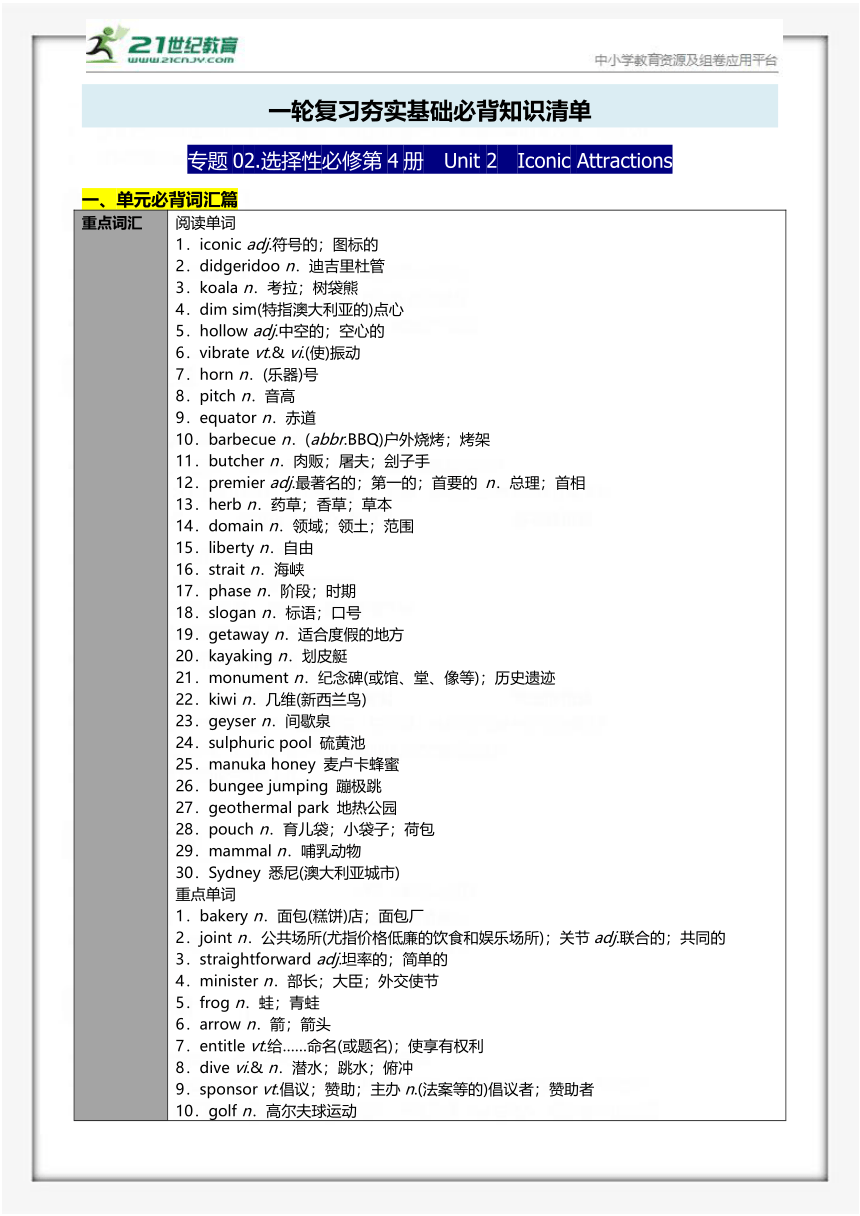
|
|
| 格式 | docx | ||
| 文件大小 | 113.4KB | ||
| 资源类型 | 试卷 | ||
| 版本资源 | 人教版(2019) | ||
| 科目 | 英语 | ||
| 更新时间 | 2022-11-18 18:06:05 | ||
图片预览

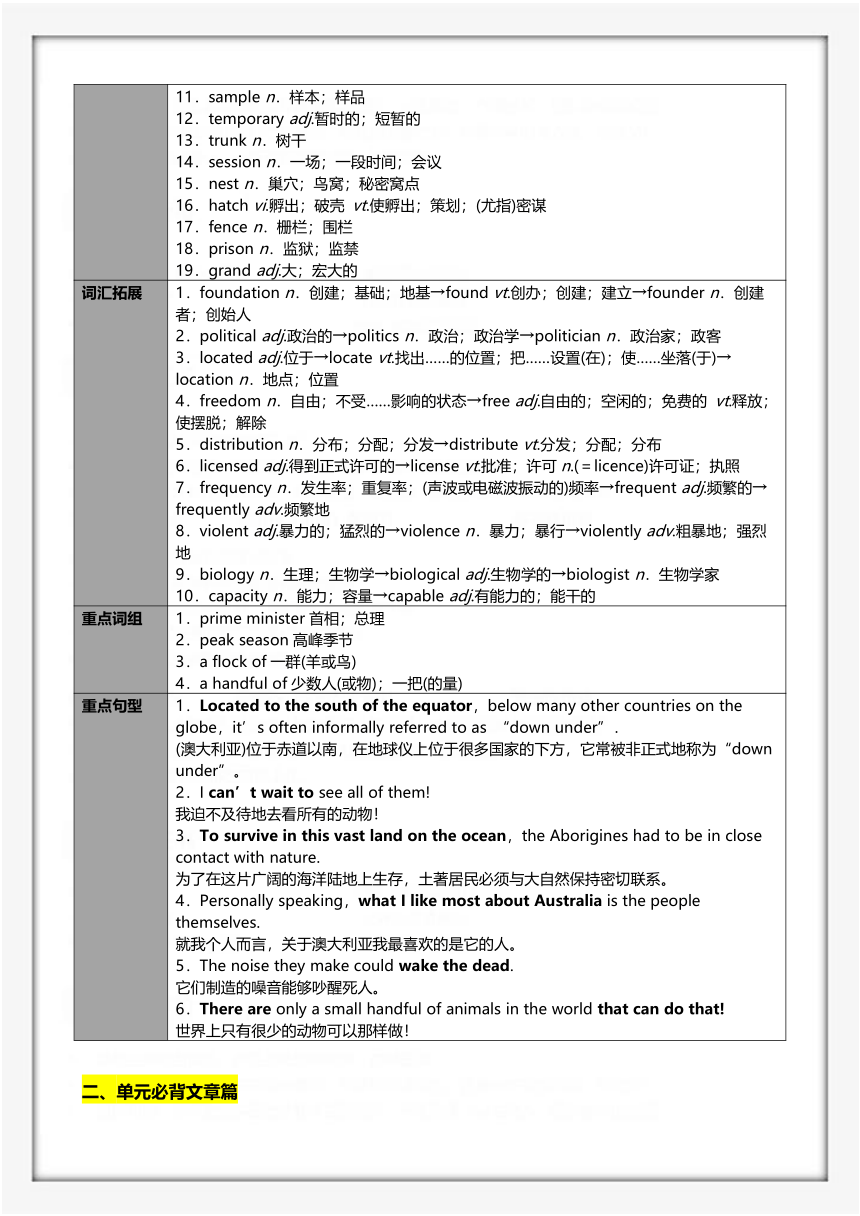
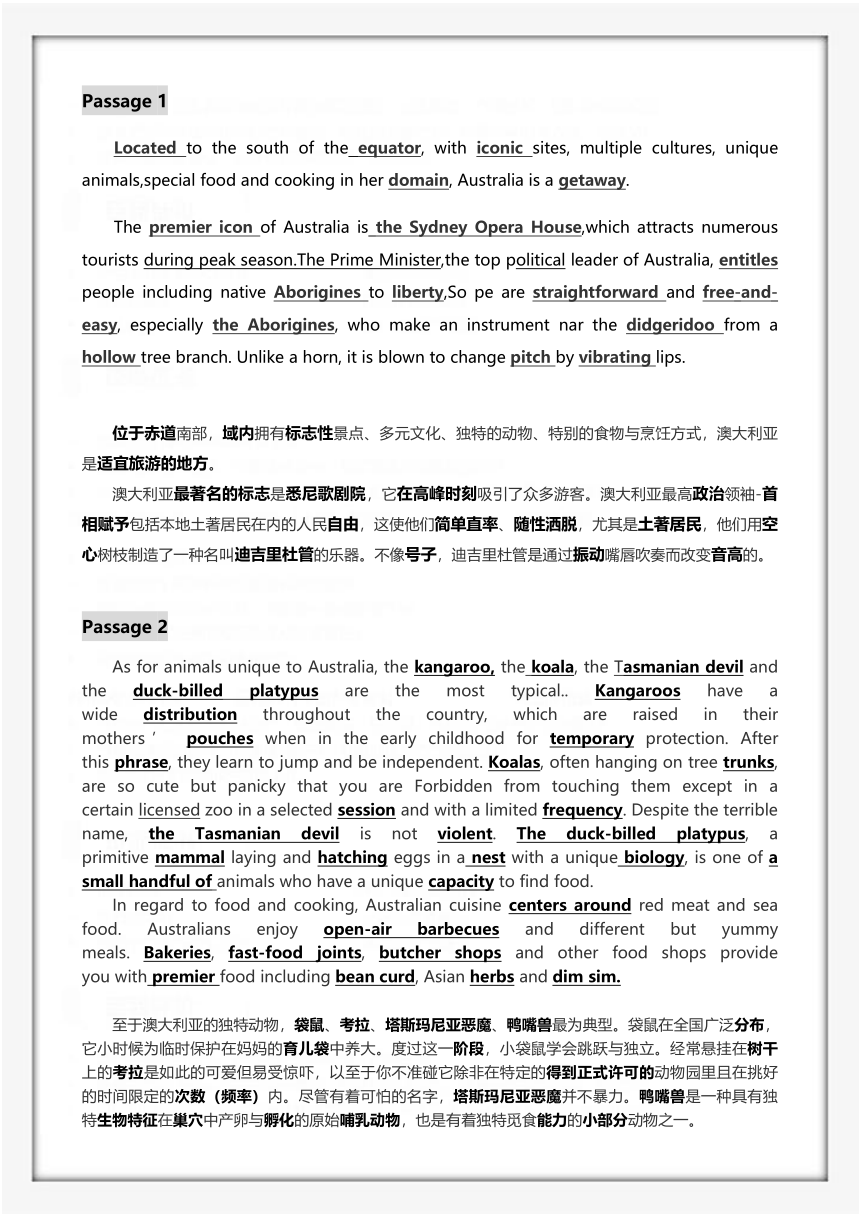
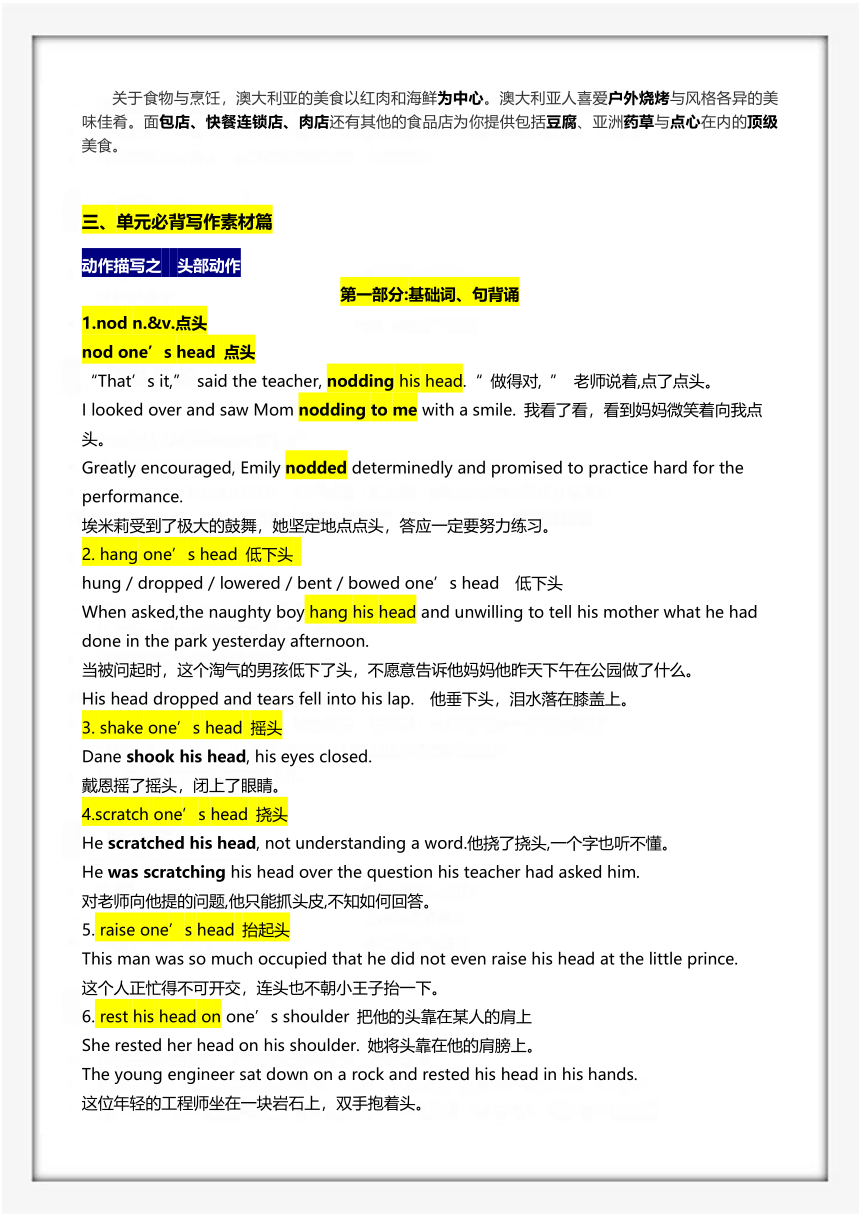
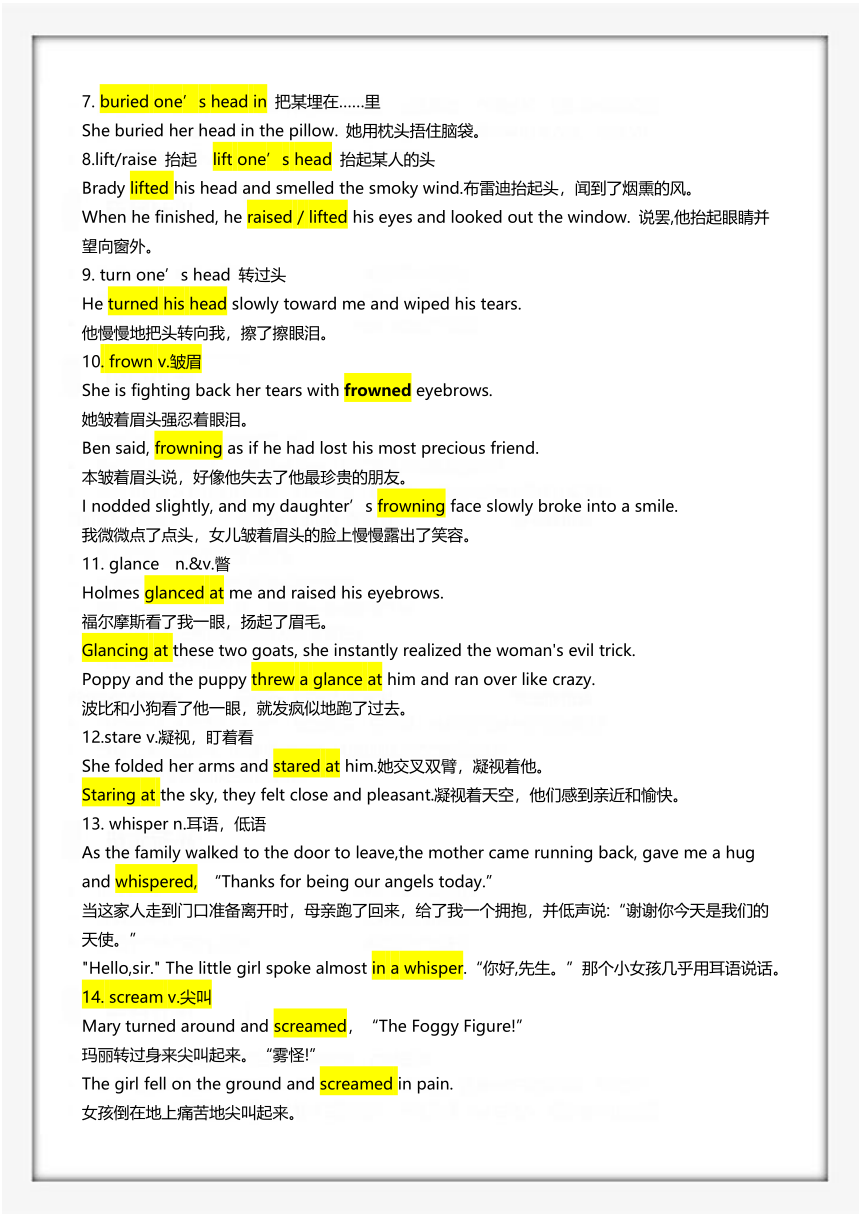
文档简介
一轮复习夯实基础必背知识清单
专题02.选择性必修第4册 Unit 2 Iconic Attractions
一、单元必背词汇篇
重点词汇 阅读单词 1.iconic adj.符号的;图标的 2.didgeridoo n.迪吉里杜管 3.koala n.考拉;树袋熊 4.dim sim(特指澳大利亚的)点心 5.hollow adj.中空的;空心的 6.vibrate vt.& vi.(使)振动 7.horn n.(乐器)号 8.pitch n.音高 9.equator n.赤道 10.barbecue n.(abbr.BBQ)户外烧烤;烤架 11.butcher n.肉贩;屠夫;刽子手 12.premier adj.最著名的;第一的;首要的 n.总理;首相 13.herb n.药草;香草;草本 14.domain n.领域;领土;范围 15.liberty n.自由 16.strait n.海峡 17.phase n.阶段;时期 18.slogan n.标语;口号 19.getaway n.适合度假的地方 20.kayaking n.划皮艇 21.monument n.纪念碑(或馆、堂、像等);历史遗迹 22.kiwi n.几维(新西兰鸟) 23.geyser n.间歇泉 24.sulphuric pool 硫黄池 25.manuka honey 麦卢卡蜂蜜 26.bungee jumping 蹦极跳 27.geothermal park 地热公园 28.pouch n.育儿袋;小袋子;荷包 29.mammal n.哺乳动物 30.Sydney 悉尼(澳大利亚城市) 重点单词 1.bakery n.面包(糕饼)店;面包厂 2.joint n.公共场所(尤指价格低廉的饮食和娱乐场所);关节adj.联合的;共同的 3.straightforward adj.坦率的;简单的 4.minister n.部长;大臣;外交使节 5.frog n.蛙;青蛙 6.arrow n.箭;箭头 7.entitle vt.给……命名(或题名);使享有权利 8.dive vi.& n.潜水;跳水;俯冲 9.sponsor vt.倡议;赞助;主办n.(法案等的)倡议者;赞助者 10.golf n.高尔夫球运动 11.sample n.样本;样品 12.temporary adj.暂时的;短暂的 13.trunk n.树干 14.session n.一场;一段时间;会议 15.nest n.巢穴;鸟窝;秘密窝点 16.hatch vi.孵出;破壳 vt.使孵出;策划;(尤指)密谋 17.fence n.栅栏;围栏 18.prison n.监狱;监禁 19.grand adj.大;宏大的
词汇拓展 1.foundation n.创建;基础;地基→found vt.创办;创建;建立→founder n.创建者;创始人 2.political adj.政治的→politics n.政治;政治学→politician n.政治家;政客 3.located adj.位于→locate vt.找出……的位置;把……设置(在);使……坐落(于)→location n.地点;位置 4.freedom n.自由;不受……影响的状态→free adj.自由的;空闲的;免费的 vt.释放;使摆脱;解除 5.distribution n.分布;分配;分发→distribute vt.分发;分配;分布 6.licensed adj.得到正式许可的→license vt.批准;许可n.(=licence)许可证;执照 7.frequency n.发生率;重复率;(声波或电磁波振动的)频率→frequent adj.频繁的→frequently adv.频繁地 8.violent adj.暴力的;猛烈的→violence n.暴力;暴行→violently adv.粗暴地;强烈地 9.biology n.生理;生物学→biological adj.生物学的→biologist n.生物学家 10.capacity n.能力;容量→capable adj.有能力的;能干的
重点词组 1.prime minister首相;总理 2.peak season高峰季节 3.a flock of一群(羊或鸟) 4.a handful of少数人(或物);一把(的量)
重点句型 1.Located to the south of the equator,below many other countries on the globe,it’s often informally referred to as “down under”. (澳大利亚)位于赤道以南,在地球仪上位于很多国家的下方,它常被非正式地称为“down under”。 2.I can’t wait to see all of them! 我迫不及待地去看所有的动物! 3.To survive in this vast land on the ocean,the Aborigines had to be in close contact with nature. 为了在这片广阔的海洋陆地上生存,土著居民必须与大自然保持密切联系。 4.Personally speaking,what I like most about Australia is the people themselves. 就我个人而言,关于澳大利亚我最喜欢的是它的人。 5.The noise they make could wake the dead. 它们制造的噪音能够吵醒死人。 6.There are only a small handful of animals in the world that can do that! 世界上只有很少的动物可以那样做!
单元必背文章篇
Passage 1
Located to the south of the equator, with iconic sites, multiple cultures, unique animals,special food and cooking in her domain, Australia is a getaway.
The premier icon of Australia is the Sydney Opera House,which attracts numerous tourists during peak season.The Prime Minister,the top political leader of Australia, entitles people including native Aborigines to liberty,So pe are straightforward and free-and-easy, especially the Aborigines, who make an instrument nar the didgeridoo from a hollow tree branch. Unlike a horn, it is blown to change pitch by vibrating lips.
位于赤道南部,域内拥有标志性景点、多元文化、独特的动物、特别的食物与烹饪方式,澳大利亚是适宜旅游的地方。
澳大利亚最著名的标志是悉尼歌剧院,它在高峰时刻吸引了众多游客。澳大利亚最高政治领袖-首相赋予包括本地土著居民在内的人民自由,这使他们简单直率、随性洒脱,尤其是土著居民,他们用空心树枝制造了一种名叫迪吉里杜管的乐器。不像号子,迪吉里杜管是通过振动嘴唇吹奏而改变音高的。
Passage 2
As for animals unique to Australia, the kangaroo, the koala, the Tasmanian devil and the duck-billed platypus are the most typical.. Kangaroos have a wide distribution throughout the country, which are raised in their mothers’ pouches when in the early childhood for temporary protection. After this phrase, they learn to jump and be independent. Koalas, often hanging on tree trunks, are so cute but panicky that you are Forbidden from touching them except in a certain licensed zoo in a selected session and with a limited frequency. Despite the terrible name, the Tasmanian devil is not violent. The duck-billed platypus, a primitive mammal laying and hatching eggs in a nest with a unique biology, is one of a small handful of animals who have a unique capacity to find food.
In regard to food and cooking, Australian cuisine centers around red meat and sea food. Australians enjoy open-air barbecues and different but yummy meals. Bakeries, fast-food joints, butcher shops and other food shops provide you with premier food including bean curd, Asian herbs and dim sim.
至于澳大利亚的独特动物,袋鼠、考拉、塔斯玛尼亚恶魔、鸭嘴兽最为典型。袋鼠在全国广泛分布,它小时候为临时保护在妈妈的育儿袋中养大。度过这一阶段,小袋鼠学会跳跃与独立。经常悬挂在树干上的考拉是如此的可爱但易受惊吓,以至于你不准碰它除非在特定的得到正式许可的动物园里且在挑好的时间限定的次数(频率)内。尽管有着可怕的名字,塔斯玛尼亚恶魔并不暴力。鸭嘴兽是一种具有独特生物特征在巢穴中产卵与孵化的原始哺乳动物,也是有着独特觅食能力的小部分动物之一。
关于食物与烹饪,澳大利亚的美食以红肉和海鲜为中心。澳大利亚人喜爱户外烧烤与风格各异的美味佳肴。面包店、快餐连锁店、肉店还有其他的食品店为你提供包括豆腐、亚洲药草与点心在内的顶级美食。
三、单元必背写作素材篇
动作描写之 头部动作
第一部分:基础词、句背诵
1.nod n.&v.点头
nod one’s head 点头
“That’s it,” said the teacher, nodding his head.“ 做得对, ” 老师说着,点了点头。
I looked over and saw Mom nodding to me with a smile. 我看了看,看到妈妈微笑着向我点头。
Greatly encouraged, Emily nodded determinedly and promised to practice hard for the performance.
埃米莉受到了极大的鼓舞,她坚定地点点头,答应一定要努力练习。
2. hang one’s head 低下头
hung / dropped / lowered / bent / bowed one’s head 低下头
When asked,the naughty boy hang his head and unwilling to tell his mother what he had done in the park yesterday afternoon.
当被问起时,这个淘气的男孩低下了头,不愿意告诉他妈妈他昨天下午在公园做了什么。
His head dropped and tears fell into his lap. 他垂下头,泪水落在膝盖上。
3. shake one’s head 摇头
Dane shook his head, his eyes closed.
戴恩摇了摇头,闭上了眼睛。
4.scratch one’s head 挠头
He scratched his head, not understanding a word.他挠了挠头,一个字也听不懂。
He was scratching his head over the question his teacher had asked him.
对老师向他提的问题,他只能抓头皮,不知如何回答。
5. raise one’s head 抬起头
This man was so much occupied that he did not even raise his head at the little prince.
这个人正忙得不可开交,连头也不朝小王子抬一下。
6. rest his head on one’s shoulder 把他的头靠在某人的肩上
She rested her head on his shoulder. 她将头靠在他的肩膀上。
The young engineer sat down on a rock and rested his head in his hands.
这位年轻的工程师坐在一块岩石上,双手抱着头。
7. buried one’s head in 把某埋在……里
She buried her head in the pillow. 她用枕头捂住脑袋。
8.lift/raise 抬起 lift one’s head 抬起某人的头
Brady lifted his head and smelled the smoky wind.布雷迪抬起头,闻到了烟熏的风。
When he finished, he raised / lifted his eyes and looked out the window. 说罢,他抬起眼睛并望向窗外。
9. turn one’s head 转过头
He turned his head slowly toward me and wiped his tears.
他慢慢地把头转向我,擦了擦眼泪。
10. frown v.皱眉
She is fighting back her tears with frowned eyebrows.
她皱着眉头强忍着眼泪。
Ben said, frowning as if he had lost his most precious friend.
本皱着眉头说,好像他失去了他最珍贵的朋友。
I nodded slightly, and my daughter’s frowning face slowly broke into a smile.
我微微点了点头,女儿皱着眉头的脸上慢慢露出了笑容。
11. glance n.&v.瞥
Holmes glanced at me and raised his eyebrows.
福尔摩斯看了我一眼,扬起了眉毛。
Glancing at these two goats, she instantly realized the woman's evil trick.
Poppy and the puppy threw a glance at him and ran over like crazy.
波比和小狗看了他一眼,就发疯似地跑了过去。
12.stare v.凝视,盯着看
She folded her arms and stared at him.她交叉双臂,凝视着他。
Staring at the sky, they felt close and pleasant.凝视着天空,他们感到亲近和愉快。
13. whisper n.耳语,低语
As the family walked to the door to leave,the mother came running back, gave me a hug and whispered, “Thanks for being our angels today.”
当这家人走到门口准备离开时,母亲跑了回来,给了我一个拥抱,并低声说:“谢谢你今天是我们的天使。”
"Hello,sir." The little girl spoke almost in a whisper.“你好,先生。”那个小女孩几乎用耳语说话。
14. scream v.尖叫
Mary turned around and screamed,“The Foggy Figure!”
玛丽转过身来尖叫起来。“雾怪!”
The girl fell on the ground and screamed in pain.
女孩倒在地上痛苦地尖叫起来。
He glared at the dog with burning eyes, screaming at the top of his lung.
他用愤怒的眼睛盯着那条狗,大声尖叫着。
15.shout v.大喊 同义=yell,cheer
I was exhausted and shouted for help. 我精疲力竭,大声呼救。
With her eyes sparkling, she struggled to her feet and shouted, “I’m here!”
她的眼睛闪闪发光,挣扎着站起来,喊道:“我在这里!”
16.murmur v.低语,细语
“How could I be so irresponsible to leave Tom and walk away irrationally ” Jane murmured.
“我怎么能如此不负责任,丢下汤姆,毫无理智地走开 ”简低声说道。
“Society has changed, people have changed,” he murmured to himself.
“社会变了,人也变了,”他自言自语道。
“Oh yes, Daddy, you know I love you.” the little girl murmured softly, trying to escape from her father’s eyes. “哦,是的,爸爸,你知道我爱你。小女孩轻声地说,想躲开父亲的目光。
Reuben murmured a thank you and ran home all the way.
鲁本低声说了声谢谢,然后一路跑回家。
17. bite v.咬 (bit, bitten)
Once bitten, twice shy. 一次被咬,下次胆小。
Tina squeezed her eyes shut and bit her lip.蒂娜闭上双眼,咬了咬嘴唇。
Sitting in my Jeep, greatly moved and speechless, I took a bite of the very meal.
我坐在吉普车里,激动得说不出话来,吃了一口饭。
Colin was pushed to the ground and bitten in the left leg.
科林被推倒在地,左腿被咬了一口。
18. sb’s eyes widened 某人的眼睛瞪大
eyes grow wide 眼睛睁大
James’s eyes widened in surprise. JAMES的眼睛充满了惊奇。
His eyes grew wide/widened with horror at what she had done.
看到她所做的事,他惊恐地睁大了眼睛
19. narrow one’s eyes 眯起眼睛
Bonning narrowed his eyes to take a careful study. Bonning.
Bonning眯起眼睛仔细研究起来。
20. grin v.咧嘴笑
His mom grinned,“I guess you don’t. It’s a snow day!”
他的妈妈咧嘴一笑。“我猜你不知道。今天是下雪天!”
He grinned from ear to ear. 他笑得合不拢嘴。
He grinned with delight when he saw us. 当他看到我们,咧开嘴开心地笑了。
四、单元必背语法篇
Grammar 过去分词
过去分词(past participle)是分词的一种。规则动词的过去分词一般是由动词加 ed构成,不规则动词的过去分词见不规则动词表。过去分词是一种非谓语动词,在句中不能单独做谓语。但它具有形容词和副词的特性,因此在句中可以作定语、表语、宾语补足语和状语。
[观察例句]
1.When the delayed flight will take off depends mainly on the weather.
2.The players selected from the whole country are expected to bring us honour in this summer's games.
3.Seen from the top of the Tiger Hill,the city of Suzhou was very beautiful.
4.I heard the door pulled.
5.She is married.
[归纳用法]
1.例句1和例句2中的黑体部分为过去分词(短语)作定语,过去分词一般位于所修饰的名词之前,而过去分词短语通常位于所修饰的名词之后。
2.例句3中的黑体部分为过去分词短语作状语,说明动作发生的时间,用于句首较为常见。
3.例句4中的黑体部分为过去分词作宾语补足语,说明宾语的性状。
4.例句5中的黑体部分为过去分词作表语,表示主语的特征或性状。
一、过去分词作定语
1.过去分词作定语时,相当于形容词,其逻辑主语就是它所修饰的名词。分词所表示的动作与其所修饰的名词构成动宾关系。
The concert given by their friends was a success.他们朋友举办的音乐会很成功。
2.单个的过去分词作定语时,常常置于其所修饰的名词前;而过去分词短语作定语时,常常置于其所修饰的名词后。
They are cleaning the fallen leaves in the yard.他们正在打扫院子里的落叶。
The meeting,attended by over five thousand people,welcomed the great hero.
(他们举行了)欢迎英雄的大会,到会的有五千多人。
3.过去分词及过去分词短语作定语一般可转换为一个定语从句。
We must adapt our regulations to the changed conditions.
=We must adapt our regulations to the conditions that have been changed.
我们必须调整规章制度来适应变化了的情况。
4.有些过去分词作前置定语与后置定语时意义不同。
in the given time在既定的时间内
with the words given用所给的单词
a concerned look一个关切的神情
the people concerned有关人士
[名师点津]
及物动词的过去分词除表示“完成”的动作之外,还表示“被动”的意义。如:spoken English(英语口语);iced beer(冰镇啤酒);cooked food(熟食);fried chips(炸土豆条)。不及物动词的过去分词常表示“完成”的动作,而不表示“被动”意义。如:boiled water(开水);fallen leaves(落叶);the risen sun(升起的太阳)等。
[即学即练1] 把下面的句子改为简单句
①Most of the people who had been questioned were students.
→ .
②Do you know the number of the books which have been ordered
→
【答案】1Most of the people questioned were students.2.Do you know the number of the books ordered
二、过去分词作表语
过去分词作表语,总是在系动词be,appear,seem,look,remain,feel,get等之后,通常表示主语所处的状态,这时过去分词可以被看作一个形容词,是形容词化的过去分词。常见的有seated,surprised,astonished,amazed,moved,exhausted,worried,devoted,pleased,inspired,encouraged,excited,delighted,satisfied,scared,frightened,disappointed 等。
I am pleased with the result of the experiment.我对试验结果很满意。
The door remained locked.门仍然锁着。
I hope we can get more involved in our community and our life will be colorful.
我希望我们更多地参与到社区中来,我们的生活将变得丰富多彩。
[名师点津]
过去分词作表语时,强调主语所处的状态;动词的被动语态表示主语是动作的承受者,强调动作。
The cup is broken.杯子破了。(强调杯子的状态)
The cup was broken by Jim.杯子是吉姆打破的。(强调动作)
[即学即练2] 完成句子
①For those with family members far away,the personal computer and .
对于那些与家人相距遥远的人来说,个人电脑和电话在保持联系方面很重要。
②While waiting for ,Henry did his best to perform his duty.
当等待机会被提升的时候,亨利尽力履行好他的职责。
【答案】1.the phone are important in staying connected2.the opportunity to get promoted
三、过去分词作宾语补足语
能用作宾语补足语的过去分词一般都是及物动词,表示被动意义或已完成意义,有时候两者兼而有之。作宾语补足语的过去分词与宾语有逻辑上的动宾关系,即宾语是过去分词动作的对象。在下面结构中常用过去分词作补语。
1.在感官动词(see,hear,notice,watch等)和表示心理状态的动词(feel,find等)后。
He watched the TV set carried out of the room.他看到电视机被搬到房间外面了。
2.表示“致使”意义的动词,如have,make,get,keep,leave等后可接过去分词作宾语补足语。
I had my leg broken in the football game.我的腿在足球赛中摔断了。
3.表示思维活动的动词,如consider,know,think等后可接过去分词作宾语补足语。
I considered the matter settled.我认为这件事解决了。
4.表示爱憎、意愿的动词,如want,wish,like,hate等。
I wanted two tickets reserved.我要预定两张机票。
5.在with的复合结构中。
He sat there,with his hands tied behind.他双手被捆在后面坐在那里。
[名师点津]
过去分词、现在分词与动词不定式作宾语
补足语时的区别
(1)过去分词作宾语补足语,表示“被动和完成”含义,或仅仅表示“状态”。
(2)现在分词作宾语补足语表示其与所修饰的词之间为主谓关系。由延续性动词转化而来的现在分词作补足语,表示过程的一部分;而由瞬间性动词转化而来的现在分词作宾语补足语,表示动作的反复。
(3)动词不定式作宾语补足语,表示动作的全过程或者是动作已经结束。
[即学即练3] 单句语法填空
①He worked so hard that he got his pay (raise).
②People in the south have their houses (make) of bamboo.
③With the whole city (build)around water,Guilin is one of the most popular tourist destinations in China.
【答案】1.raised 2.made 3.built
四、过去分词作状语
过去分词作状语,修饰谓语动词,进一步说明谓语动词的动作和状态,即动作发生时的背景或状况,其逻辑主语通常就是句子的主语,且过去分词与主语之间为动宾关系。
(一)过去分词(短语)作状语的句法功能和位置
1.过去分词(短语)表示被动,表示动作已经完成,其逻辑主语则为句子的主语。过去分词作状语时,可单独使用,也可以在其前面加上适当的连词,可表示时间、条件、原因、让步、方式、伴随等。
When offered help,one often says “Thank you” or “It's kind of you”.(时间状语)
当被提供帮助的时候,人们常说“Thank you”或“It's kind of you”。
Given another chance,I will do it much better.(条件状语)如果再给我一次机会,我会做得更好。
Greatly inspired by what he did,I joined him in helping others.(原因状语)
在他所做的事情的巨大鼓舞下,我也加入了帮助他人的行列。
Visited many times,the place is still worth visiting again.(让步状语)
虽然已参观了很多次,这个地方仍值得再来。
He has been preparing his paper all day long,locked in the host.(方式状语)
锁在书房里,他一整天都在准备论文。
The guest walked into the room,greeted by the host.(伴随状语)
客人一边和主人打招呼,一边走进了房间。
2.过去分词(短语)在句中作状语时,既可放在句首,也可放在句尾,中间用逗号隔开。
Caught in a heavy rain,he was all wet.因为淋了一场大雨,所以他全身湿透了。
He stood there silently,moved to tears.
=Moved to tears,he stood there silently.他静静地站在那里,被感动得热泪盈眶。
[即学即练4]
写出下列句中黑体部分分别充当什么状语
①Clearly and thoughtfully written,the book inspires confidence in students who wish to seek their own answers. 原因状语
②Time,used correctly,is money in the bank. 条件状语
③If asked to look after luggage for someone else,inform the police at once. 条件状语
④Seated at the table,my father and I were talking about my job.方式状语
⑤When(you are) given a medical examination,you should keep calm.时间状语
(二)过去分词(短语)作状语的几种情况
1.过去分词在句中作时间、条件、原因、让步状语时,相当于对应的时间、条件、原因及让步状语从句。
Seen from the top of the mountain(=When it is seen from the top of the mountain),the whole town looks more beautiful.
从山顶上看,整个城市看起来更美了。
Encouraged by the progress he has made,he works harder.=As he is encouraged by the progress he has made,he works harder.
由于受到所取得进步的鼓舞,他工作更努力了。
2.过去分词在句中作伴随、方式等状语时,可改为句子的并列谓语或改为并列分句。
The teacher came into the room,followed by two students(=and was followed by two students).老师走进了房间,后面跟着两个学生。
He spent the whole afternoon,locked in his study(=and was locked in his study).
他把自己锁在书房里度过了一整个下午。
3.过去分词作状语可与与之对应的状语从句互换。而从句连词改成过去分词作状语时有时还可保留连词,构成“连词+过去分词”结构作状语。
Even if I am invited(=Even if invited),I will not take part in the party.即使被邀请,我也不会参加那个宴会。
Unless you are asked to speak(=Unless asked to speak),you should remain silent at the meeting.
除非被要求发言,在会上你应该保持沉默。
4.过去分词(短语)作状语时,过去分词(短语)的逻辑主语通常是句子的主语,否则,分词(短语)前应加上自己的主语。这种带有自身主语的过去分词(短语)被称为过去分词(短语)的独立结构。过去分词(短语)的独立结构通常在句中作状语,可表示时间、原因、条件等。
The test finished,we began our holiday.测试结束了,我们开始放假了。
More time given,we could have done it much better.如果给我们更多的时间,我们会做得更好。
[即学即练5] 句型转换
①When they were asked who had broken the vase,the children all kept silent.
→ ,the children all kept silent.
②If we are united,we will make our life better.
→ ,we will make our life better.
③Although we were exhausted by the hard work,we went on with it.
→ ,we went on with it.
【答案】1.Asked who had broken the vase2.United3.Exhausted by the hard work
(三)现在分词与过去分词作状语的区别
现在分词与过去分词作状语的最主要的区别在于两者与其逻辑主语的主动与被动关系。
1.现在分词作状语时,现在分词的动作就是句子主语发出的动作,它们之间是主动关系。现在分词动作与谓语动作同时发生用一般式doing;如果现在分词的动作发生在谓语动作之前,表示已经完成、表示主动就用having done,表示被动就用having been done。
Walking along the street,I met a friend of mine.沿着大街走时,我碰到了我的一个朋友。
Having finished their work,they went home to have a rest.完成工作后,他们回家休息一下。
2.过去分词作状语时,过去分词表示的动作是句子主语承受的动作,它们之间的关系是被动关系。
Given more attention,the tree could have grown better.如果给予更多的关注,小树本来能够长得更好一些。
Grown in rich soil,these seeds can grow fast.如果种在肥沃的土壤里,这些种子能长得很快。
[即学即练6] 单句语法填空
① (impress) by the beautiful scenery,I forgot to go back home in time.
② (look) out of the window,I found many children playing on the playground.
Ⅰ.单句语法填空
1.I heard my name (call) when I came in.
2.She looked (disappoint) at the results of the exam.
3.Who were the so called guests (invite) to your party last night
4.Back from his two year medical service in Africa,Dr Lee was very happy to see his mother
(take)good care of at home.
5.John Snow told the story about the (astonish) people in Broad Street.
6.In art criticism,you must assume the artist has a secret message (hide) within the work.
7. (found) in the early 20th century,the school keeps on inspiring children's love of art.
8. (face) with the increasing unemployment,many people went on strike in most of the European countries.
9.If (give) better attention,the serious accident could have been avoided.
10.The hospital has recently obtained new medical equipment, (allow) more patients to be treated.
【答案】1.called 2.disappointed 3.invited 4.taken 5.astonished 6.hidden 7.Founded 8.Faced 9.given 10.allowing
专题02.选择性必修第4册 Unit 2 Iconic Attractions
一、单元必背词汇篇
重点词汇 阅读单词 1.iconic adj.符号的;图标的 2.didgeridoo n.迪吉里杜管 3.koala n.考拉;树袋熊 4.dim sim(特指澳大利亚的)点心 5.hollow adj.中空的;空心的 6.vibrate vt.& vi.(使)振动 7.horn n.(乐器)号 8.pitch n.音高 9.equator n.赤道 10.barbecue n.(abbr.BBQ)户外烧烤;烤架 11.butcher n.肉贩;屠夫;刽子手 12.premier adj.最著名的;第一的;首要的 n.总理;首相 13.herb n.药草;香草;草本 14.domain n.领域;领土;范围 15.liberty n.自由 16.strait n.海峡 17.phase n.阶段;时期 18.slogan n.标语;口号 19.getaway n.适合度假的地方 20.kayaking n.划皮艇 21.monument n.纪念碑(或馆、堂、像等);历史遗迹 22.kiwi n.几维(新西兰鸟) 23.geyser n.间歇泉 24.sulphuric pool 硫黄池 25.manuka honey 麦卢卡蜂蜜 26.bungee jumping 蹦极跳 27.geothermal park 地热公园 28.pouch n.育儿袋;小袋子;荷包 29.mammal n.哺乳动物 30.Sydney 悉尼(澳大利亚城市) 重点单词 1.bakery n.面包(糕饼)店;面包厂 2.joint n.公共场所(尤指价格低廉的饮食和娱乐场所);关节adj.联合的;共同的 3.straightforward adj.坦率的;简单的 4.minister n.部长;大臣;外交使节 5.frog n.蛙;青蛙 6.arrow n.箭;箭头 7.entitle vt.给……命名(或题名);使享有权利 8.dive vi.& n.潜水;跳水;俯冲 9.sponsor vt.倡议;赞助;主办n.(法案等的)倡议者;赞助者 10.golf n.高尔夫球运动 11.sample n.样本;样品 12.temporary adj.暂时的;短暂的 13.trunk n.树干 14.session n.一场;一段时间;会议 15.nest n.巢穴;鸟窝;秘密窝点 16.hatch vi.孵出;破壳 vt.使孵出;策划;(尤指)密谋 17.fence n.栅栏;围栏 18.prison n.监狱;监禁 19.grand adj.大;宏大的
词汇拓展 1.foundation n.创建;基础;地基→found vt.创办;创建;建立→founder n.创建者;创始人 2.political adj.政治的→politics n.政治;政治学→politician n.政治家;政客 3.located adj.位于→locate vt.找出……的位置;把……设置(在);使……坐落(于)→location n.地点;位置 4.freedom n.自由;不受……影响的状态→free adj.自由的;空闲的;免费的 vt.释放;使摆脱;解除 5.distribution n.分布;分配;分发→distribute vt.分发;分配;分布 6.licensed adj.得到正式许可的→license vt.批准;许可n.(=licence)许可证;执照 7.frequency n.发生率;重复率;(声波或电磁波振动的)频率→frequent adj.频繁的→frequently adv.频繁地 8.violent adj.暴力的;猛烈的→violence n.暴力;暴行→violently adv.粗暴地;强烈地 9.biology n.生理;生物学→biological adj.生物学的→biologist n.生物学家 10.capacity n.能力;容量→capable adj.有能力的;能干的
重点词组 1.prime minister首相;总理 2.peak season高峰季节 3.a flock of一群(羊或鸟) 4.a handful of少数人(或物);一把(的量)
重点句型 1.Located to the south of the equator,below many other countries on the globe,it’s often informally referred to as “down under”. (澳大利亚)位于赤道以南,在地球仪上位于很多国家的下方,它常被非正式地称为“down under”。 2.I can’t wait to see all of them! 我迫不及待地去看所有的动物! 3.To survive in this vast land on the ocean,the Aborigines had to be in close contact with nature. 为了在这片广阔的海洋陆地上生存,土著居民必须与大自然保持密切联系。 4.Personally speaking,what I like most about Australia is the people themselves. 就我个人而言,关于澳大利亚我最喜欢的是它的人。 5.The noise they make could wake the dead. 它们制造的噪音能够吵醒死人。 6.There are only a small handful of animals in the world that can do that! 世界上只有很少的动物可以那样做!
单元必背文章篇
Passage 1
Located to the south of the equator, with iconic sites, multiple cultures, unique animals,special food and cooking in her domain, Australia is a getaway.
The premier icon of Australia is the Sydney Opera House,which attracts numerous tourists during peak season.The Prime Minister,the top political leader of Australia, entitles people including native Aborigines to liberty,So pe are straightforward and free-and-easy, especially the Aborigines, who make an instrument nar the didgeridoo from a hollow tree branch. Unlike a horn, it is blown to change pitch by vibrating lips.
位于赤道南部,域内拥有标志性景点、多元文化、独特的动物、特别的食物与烹饪方式,澳大利亚是适宜旅游的地方。
澳大利亚最著名的标志是悉尼歌剧院,它在高峰时刻吸引了众多游客。澳大利亚最高政治领袖-首相赋予包括本地土著居民在内的人民自由,这使他们简单直率、随性洒脱,尤其是土著居民,他们用空心树枝制造了一种名叫迪吉里杜管的乐器。不像号子,迪吉里杜管是通过振动嘴唇吹奏而改变音高的。
Passage 2
As for animals unique to Australia, the kangaroo, the koala, the Tasmanian devil and the duck-billed platypus are the most typical.. Kangaroos have a wide distribution throughout the country, which are raised in their mothers’ pouches when in the early childhood for temporary protection. After this phrase, they learn to jump and be independent. Koalas, often hanging on tree trunks, are so cute but panicky that you are Forbidden from touching them except in a certain licensed zoo in a selected session and with a limited frequency. Despite the terrible name, the Tasmanian devil is not violent. The duck-billed platypus, a primitive mammal laying and hatching eggs in a nest with a unique biology, is one of a small handful of animals who have a unique capacity to find food.
In regard to food and cooking, Australian cuisine centers around red meat and sea food. Australians enjoy open-air barbecues and different but yummy meals. Bakeries, fast-food joints, butcher shops and other food shops provide you with premier food including bean curd, Asian herbs and dim sim.
至于澳大利亚的独特动物,袋鼠、考拉、塔斯玛尼亚恶魔、鸭嘴兽最为典型。袋鼠在全国广泛分布,它小时候为临时保护在妈妈的育儿袋中养大。度过这一阶段,小袋鼠学会跳跃与独立。经常悬挂在树干上的考拉是如此的可爱但易受惊吓,以至于你不准碰它除非在特定的得到正式许可的动物园里且在挑好的时间限定的次数(频率)内。尽管有着可怕的名字,塔斯玛尼亚恶魔并不暴力。鸭嘴兽是一种具有独特生物特征在巢穴中产卵与孵化的原始哺乳动物,也是有着独特觅食能力的小部分动物之一。
关于食物与烹饪,澳大利亚的美食以红肉和海鲜为中心。澳大利亚人喜爱户外烧烤与风格各异的美味佳肴。面包店、快餐连锁店、肉店还有其他的食品店为你提供包括豆腐、亚洲药草与点心在内的顶级美食。
三、单元必背写作素材篇
动作描写之 头部动作
第一部分:基础词、句背诵
1.nod n.&v.点头
nod one’s head 点头
“That’s it,” said the teacher, nodding his head.“ 做得对, ” 老师说着,点了点头。
I looked over and saw Mom nodding to me with a smile. 我看了看,看到妈妈微笑着向我点头。
Greatly encouraged, Emily nodded determinedly and promised to practice hard for the performance.
埃米莉受到了极大的鼓舞,她坚定地点点头,答应一定要努力练习。
2. hang one’s head 低下头
hung / dropped / lowered / bent / bowed one’s head 低下头
When asked,the naughty boy hang his head and unwilling to tell his mother what he had done in the park yesterday afternoon.
当被问起时,这个淘气的男孩低下了头,不愿意告诉他妈妈他昨天下午在公园做了什么。
His head dropped and tears fell into his lap. 他垂下头,泪水落在膝盖上。
3. shake one’s head 摇头
Dane shook his head, his eyes closed.
戴恩摇了摇头,闭上了眼睛。
4.scratch one’s head 挠头
He scratched his head, not understanding a word.他挠了挠头,一个字也听不懂。
He was scratching his head over the question his teacher had asked him.
对老师向他提的问题,他只能抓头皮,不知如何回答。
5. raise one’s head 抬起头
This man was so much occupied that he did not even raise his head at the little prince.
这个人正忙得不可开交,连头也不朝小王子抬一下。
6. rest his head on one’s shoulder 把他的头靠在某人的肩上
She rested her head on his shoulder. 她将头靠在他的肩膀上。
The young engineer sat down on a rock and rested his head in his hands.
这位年轻的工程师坐在一块岩石上,双手抱着头。
7. buried one’s head in 把某埋在……里
She buried her head in the pillow. 她用枕头捂住脑袋。
8.lift/raise 抬起 lift one’s head 抬起某人的头
Brady lifted his head and smelled the smoky wind.布雷迪抬起头,闻到了烟熏的风。
When he finished, he raised / lifted his eyes and looked out the window. 说罢,他抬起眼睛并望向窗外。
9. turn one’s head 转过头
He turned his head slowly toward me and wiped his tears.
他慢慢地把头转向我,擦了擦眼泪。
10. frown v.皱眉
She is fighting back her tears with frowned eyebrows.
她皱着眉头强忍着眼泪。
Ben said, frowning as if he had lost his most precious friend.
本皱着眉头说,好像他失去了他最珍贵的朋友。
I nodded slightly, and my daughter’s frowning face slowly broke into a smile.
我微微点了点头,女儿皱着眉头的脸上慢慢露出了笑容。
11. glance n.&v.瞥
Holmes glanced at me and raised his eyebrows.
福尔摩斯看了我一眼,扬起了眉毛。
Glancing at these two goats, she instantly realized the woman's evil trick.
Poppy and the puppy threw a glance at him and ran over like crazy.
波比和小狗看了他一眼,就发疯似地跑了过去。
12.stare v.凝视,盯着看
She folded her arms and stared at him.她交叉双臂,凝视着他。
Staring at the sky, they felt close and pleasant.凝视着天空,他们感到亲近和愉快。
13. whisper n.耳语,低语
As the family walked to the door to leave,the mother came running back, gave me a hug and whispered, “Thanks for being our angels today.”
当这家人走到门口准备离开时,母亲跑了回来,给了我一个拥抱,并低声说:“谢谢你今天是我们的天使。”
"Hello,sir." The little girl spoke almost in a whisper.“你好,先生。”那个小女孩几乎用耳语说话。
14. scream v.尖叫
Mary turned around and screamed,“The Foggy Figure!”
玛丽转过身来尖叫起来。“雾怪!”
The girl fell on the ground and screamed in pain.
女孩倒在地上痛苦地尖叫起来。
He glared at the dog with burning eyes, screaming at the top of his lung.
他用愤怒的眼睛盯着那条狗,大声尖叫着。
15.shout v.大喊 同义=yell,cheer
I was exhausted and shouted for help. 我精疲力竭,大声呼救。
With her eyes sparkling, she struggled to her feet and shouted, “I’m here!”
她的眼睛闪闪发光,挣扎着站起来,喊道:“我在这里!”
16.murmur v.低语,细语
“How could I be so irresponsible to leave Tom and walk away irrationally ” Jane murmured.
“我怎么能如此不负责任,丢下汤姆,毫无理智地走开 ”简低声说道。
“Society has changed, people have changed,” he murmured to himself.
“社会变了,人也变了,”他自言自语道。
“Oh yes, Daddy, you know I love you.” the little girl murmured softly, trying to escape from her father’s eyes. “哦,是的,爸爸,你知道我爱你。小女孩轻声地说,想躲开父亲的目光。
Reuben murmured a thank you and ran home all the way.
鲁本低声说了声谢谢,然后一路跑回家。
17. bite v.咬 (bit, bitten)
Once bitten, twice shy. 一次被咬,下次胆小。
Tina squeezed her eyes shut and bit her lip.蒂娜闭上双眼,咬了咬嘴唇。
Sitting in my Jeep, greatly moved and speechless, I took a bite of the very meal.
我坐在吉普车里,激动得说不出话来,吃了一口饭。
Colin was pushed to the ground and bitten in the left leg.
科林被推倒在地,左腿被咬了一口。
18. sb’s eyes widened 某人的眼睛瞪大
eyes grow wide 眼睛睁大
James’s eyes widened in surprise. JAMES的眼睛充满了惊奇。
His eyes grew wide/widened with horror at what she had done.
看到她所做的事,他惊恐地睁大了眼睛
19. narrow one’s eyes 眯起眼睛
Bonning narrowed his eyes to take a careful study. Bonning.
Bonning眯起眼睛仔细研究起来。
20. grin v.咧嘴笑
His mom grinned,“I guess you don’t. It’s a snow day!”
他的妈妈咧嘴一笑。“我猜你不知道。今天是下雪天!”
He grinned from ear to ear. 他笑得合不拢嘴。
He grinned with delight when he saw us. 当他看到我们,咧开嘴开心地笑了。
四、单元必背语法篇
Grammar 过去分词
过去分词(past participle)是分词的一种。规则动词的过去分词一般是由动词加 ed构成,不规则动词的过去分词见不规则动词表。过去分词是一种非谓语动词,在句中不能单独做谓语。但它具有形容词和副词的特性,因此在句中可以作定语、表语、宾语补足语和状语。
[观察例句]
1.When the delayed flight will take off depends mainly on the weather.
2.The players selected from the whole country are expected to bring us honour in this summer's games.
3.Seen from the top of the Tiger Hill,the city of Suzhou was very beautiful.
4.I heard the door pulled.
5.She is married.
[归纳用法]
1.例句1和例句2中的黑体部分为过去分词(短语)作定语,过去分词一般位于所修饰的名词之前,而过去分词短语通常位于所修饰的名词之后。
2.例句3中的黑体部分为过去分词短语作状语,说明动作发生的时间,用于句首较为常见。
3.例句4中的黑体部分为过去分词作宾语补足语,说明宾语的性状。
4.例句5中的黑体部分为过去分词作表语,表示主语的特征或性状。
一、过去分词作定语
1.过去分词作定语时,相当于形容词,其逻辑主语就是它所修饰的名词。分词所表示的动作与其所修饰的名词构成动宾关系。
The concert given by their friends was a success.他们朋友举办的音乐会很成功。
2.单个的过去分词作定语时,常常置于其所修饰的名词前;而过去分词短语作定语时,常常置于其所修饰的名词后。
They are cleaning the fallen leaves in the yard.他们正在打扫院子里的落叶。
The meeting,attended by over five thousand people,welcomed the great hero.
(他们举行了)欢迎英雄的大会,到会的有五千多人。
3.过去分词及过去分词短语作定语一般可转换为一个定语从句。
We must adapt our regulations to the changed conditions.
=We must adapt our regulations to the conditions that have been changed.
我们必须调整规章制度来适应变化了的情况。
4.有些过去分词作前置定语与后置定语时意义不同。
in the given time在既定的时间内
with the words given用所给的单词
a concerned look一个关切的神情
the people concerned有关人士
[名师点津]
及物动词的过去分词除表示“完成”的动作之外,还表示“被动”的意义。如:spoken English(英语口语);iced beer(冰镇啤酒);cooked food(熟食);fried chips(炸土豆条)。不及物动词的过去分词常表示“完成”的动作,而不表示“被动”意义。如:boiled water(开水);fallen leaves(落叶);the risen sun(升起的太阳)等。
[即学即练1] 把下面的句子改为简单句
①Most of the people who had been questioned were students.
→ .
②Do you know the number of the books which have been ordered
→
【答案】1Most of the people questioned were students.2.Do you know the number of the books ordered
二、过去分词作表语
过去分词作表语,总是在系动词be,appear,seem,look,remain,feel,get等之后,通常表示主语所处的状态,这时过去分词可以被看作一个形容词,是形容词化的过去分词。常见的有seated,surprised,astonished,amazed,moved,exhausted,worried,devoted,pleased,inspired,encouraged,excited,delighted,satisfied,scared,frightened,disappointed 等。
I am pleased with the result of the experiment.我对试验结果很满意。
The door remained locked.门仍然锁着。
I hope we can get more involved in our community and our life will be colorful.
我希望我们更多地参与到社区中来,我们的生活将变得丰富多彩。
[名师点津]
过去分词作表语时,强调主语所处的状态;动词的被动语态表示主语是动作的承受者,强调动作。
The cup is broken.杯子破了。(强调杯子的状态)
The cup was broken by Jim.杯子是吉姆打破的。(强调动作)
[即学即练2] 完成句子
①For those with family members far away,the personal computer and .
对于那些与家人相距遥远的人来说,个人电脑和电话在保持联系方面很重要。
②While waiting for ,Henry did his best to perform his duty.
当等待机会被提升的时候,亨利尽力履行好他的职责。
【答案】1.the phone are important in staying connected2.the opportunity to get promoted
三、过去分词作宾语补足语
能用作宾语补足语的过去分词一般都是及物动词,表示被动意义或已完成意义,有时候两者兼而有之。作宾语补足语的过去分词与宾语有逻辑上的动宾关系,即宾语是过去分词动作的对象。在下面结构中常用过去分词作补语。
1.在感官动词(see,hear,notice,watch等)和表示心理状态的动词(feel,find等)后。
He watched the TV set carried out of the room.他看到电视机被搬到房间外面了。
2.表示“致使”意义的动词,如have,make,get,keep,leave等后可接过去分词作宾语补足语。
I had my leg broken in the football game.我的腿在足球赛中摔断了。
3.表示思维活动的动词,如consider,know,think等后可接过去分词作宾语补足语。
I considered the matter settled.我认为这件事解决了。
4.表示爱憎、意愿的动词,如want,wish,like,hate等。
I wanted two tickets reserved.我要预定两张机票。
5.在with的复合结构中。
He sat there,with his hands tied behind.他双手被捆在后面坐在那里。
[名师点津]
过去分词、现在分词与动词不定式作宾语
补足语时的区别
(1)过去分词作宾语补足语,表示“被动和完成”含义,或仅仅表示“状态”。
(2)现在分词作宾语补足语表示其与所修饰的词之间为主谓关系。由延续性动词转化而来的现在分词作补足语,表示过程的一部分;而由瞬间性动词转化而来的现在分词作宾语补足语,表示动作的反复。
(3)动词不定式作宾语补足语,表示动作的全过程或者是动作已经结束。
[即学即练3] 单句语法填空
①He worked so hard that he got his pay (raise).
②People in the south have their houses (make) of bamboo.
③With the whole city (build)around water,Guilin is one of the most popular tourist destinations in China.
【答案】1.raised 2.made 3.built
四、过去分词作状语
过去分词作状语,修饰谓语动词,进一步说明谓语动词的动作和状态,即动作发生时的背景或状况,其逻辑主语通常就是句子的主语,且过去分词与主语之间为动宾关系。
(一)过去分词(短语)作状语的句法功能和位置
1.过去分词(短语)表示被动,表示动作已经完成,其逻辑主语则为句子的主语。过去分词作状语时,可单独使用,也可以在其前面加上适当的连词,可表示时间、条件、原因、让步、方式、伴随等。
When offered help,one often says “Thank you” or “It's kind of you”.(时间状语)
当被提供帮助的时候,人们常说“Thank you”或“It's kind of you”。
Given another chance,I will do it much better.(条件状语)如果再给我一次机会,我会做得更好。
Greatly inspired by what he did,I joined him in helping others.(原因状语)
在他所做的事情的巨大鼓舞下,我也加入了帮助他人的行列。
Visited many times,the place is still worth visiting again.(让步状语)
虽然已参观了很多次,这个地方仍值得再来。
He has been preparing his paper all day long,locked in the host.(方式状语)
锁在书房里,他一整天都在准备论文。
The guest walked into the room,greeted by the host.(伴随状语)
客人一边和主人打招呼,一边走进了房间。
2.过去分词(短语)在句中作状语时,既可放在句首,也可放在句尾,中间用逗号隔开。
Caught in a heavy rain,he was all wet.因为淋了一场大雨,所以他全身湿透了。
He stood there silently,moved to tears.
=Moved to tears,he stood there silently.他静静地站在那里,被感动得热泪盈眶。
[即学即练4]
写出下列句中黑体部分分别充当什么状语
①Clearly and thoughtfully written,the book inspires confidence in students who wish to seek their own answers. 原因状语
②Time,used correctly,is money in the bank. 条件状语
③If asked to look after luggage for someone else,inform the police at once. 条件状语
④Seated at the table,my father and I were talking about my job.方式状语
⑤When(you are) given a medical examination,you should keep calm.时间状语
(二)过去分词(短语)作状语的几种情况
1.过去分词在句中作时间、条件、原因、让步状语时,相当于对应的时间、条件、原因及让步状语从句。
Seen from the top of the mountain(=When it is seen from the top of the mountain),the whole town looks more beautiful.
从山顶上看,整个城市看起来更美了。
Encouraged by the progress he has made,he works harder.=As he is encouraged by the progress he has made,he works harder.
由于受到所取得进步的鼓舞,他工作更努力了。
2.过去分词在句中作伴随、方式等状语时,可改为句子的并列谓语或改为并列分句。
The teacher came into the room,followed by two students(=and was followed by two students).老师走进了房间,后面跟着两个学生。
He spent the whole afternoon,locked in his study(=and was locked in his study).
他把自己锁在书房里度过了一整个下午。
3.过去分词作状语可与与之对应的状语从句互换。而从句连词改成过去分词作状语时有时还可保留连词,构成“连词+过去分词”结构作状语。
Even if I am invited(=Even if invited),I will not take part in the party.即使被邀请,我也不会参加那个宴会。
Unless you are asked to speak(=Unless asked to speak),you should remain silent at the meeting.
除非被要求发言,在会上你应该保持沉默。
4.过去分词(短语)作状语时,过去分词(短语)的逻辑主语通常是句子的主语,否则,分词(短语)前应加上自己的主语。这种带有自身主语的过去分词(短语)被称为过去分词(短语)的独立结构。过去分词(短语)的独立结构通常在句中作状语,可表示时间、原因、条件等。
The test finished,we began our holiday.测试结束了,我们开始放假了。
More time given,we could have done it much better.如果给我们更多的时间,我们会做得更好。
[即学即练5] 句型转换
①When they were asked who had broken the vase,the children all kept silent.
→ ,the children all kept silent.
②If we are united,we will make our life better.
→ ,we will make our life better.
③Although we were exhausted by the hard work,we went on with it.
→ ,we went on with it.
【答案】1.Asked who had broken the vase2.United3.Exhausted by the hard work
(三)现在分词与过去分词作状语的区别
现在分词与过去分词作状语的最主要的区别在于两者与其逻辑主语的主动与被动关系。
1.现在分词作状语时,现在分词的动作就是句子主语发出的动作,它们之间是主动关系。现在分词动作与谓语动作同时发生用一般式doing;如果现在分词的动作发生在谓语动作之前,表示已经完成、表示主动就用having done,表示被动就用having been done。
Walking along the street,I met a friend of mine.沿着大街走时,我碰到了我的一个朋友。
Having finished their work,they went home to have a rest.完成工作后,他们回家休息一下。
2.过去分词作状语时,过去分词表示的动作是句子主语承受的动作,它们之间的关系是被动关系。
Given more attention,the tree could have grown better.如果给予更多的关注,小树本来能够长得更好一些。
Grown in rich soil,these seeds can grow fast.如果种在肥沃的土壤里,这些种子能长得很快。
[即学即练6] 单句语法填空
① (impress) by the beautiful scenery,I forgot to go back home in time.
② (look) out of the window,I found many children playing on the playground.
Ⅰ.单句语法填空
1.I heard my name (call) when I came in.
2.She looked (disappoint) at the results of the exam.
3.Who were the so called guests (invite) to your party last night
4.Back from his two year medical service in Africa,Dr Lee was very happy to see his mother
(take)good care of at home.
5.John Snow told the story about the (astonish) people in Broad Street.
6.In art criticism,you must assume the artist has a secret message (hide) within the work.
7. (found) in the early 20th century,the school keeps on inspiring children's love of art.
8. (face) with the increasing unemployment,many people went on strike in most of the European countries.
9.If (give) better attention,the serious accident could have been avoided.
10.The hospital has recently obtained new medical equipment, (allow) more patients to be treated.
【答案】1.called 2.disappointed 3.invited 4.taken 5.astonished 6.hidden 7.Founded 8.Faced 9.given 10.allowing
